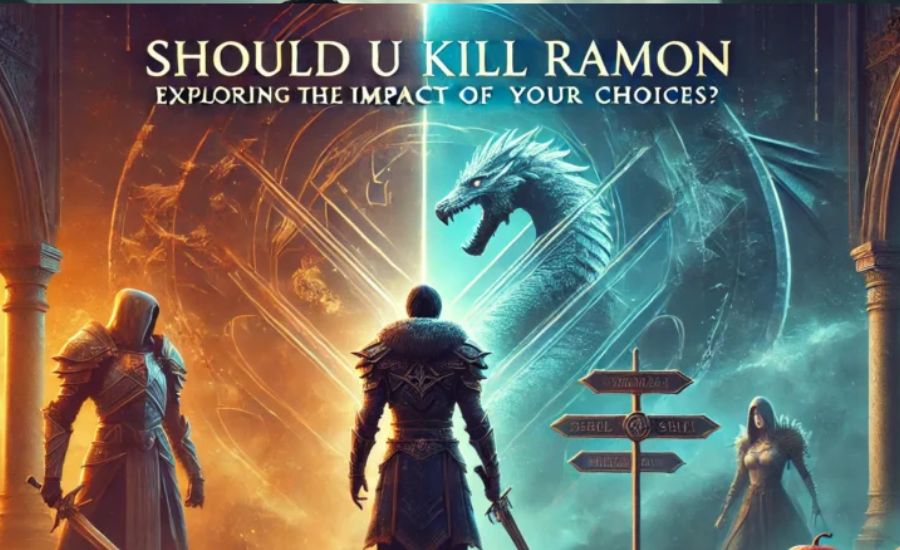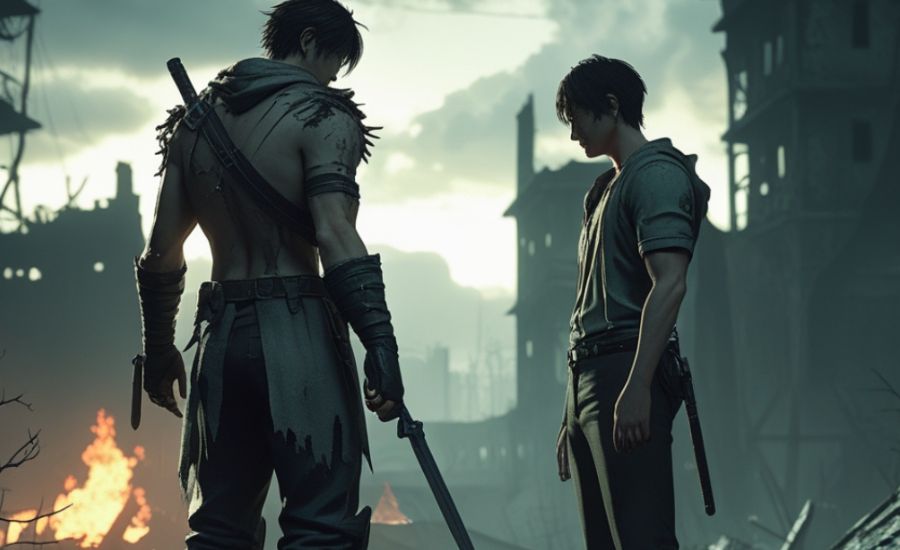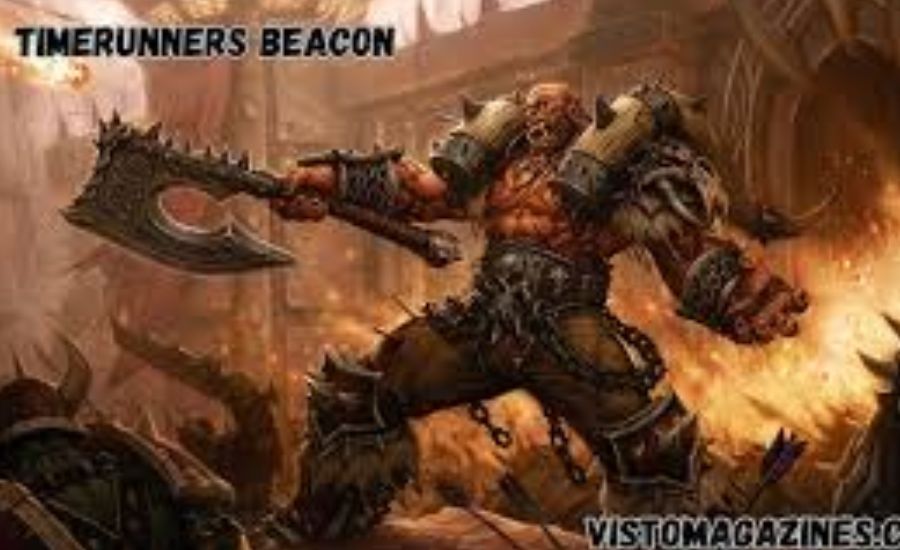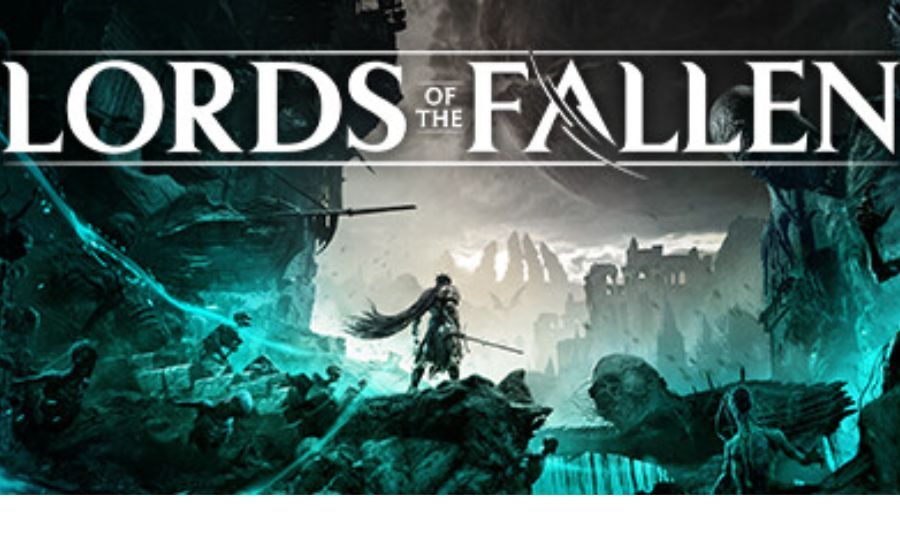Introduction
In Danganronpa: Another Episode – Dds2 Should U Kill Ramon), players encounter one of the most notion-frightening dilemmas in the sport: “Should you kill Ramon?” This query isn’t just a narrative tool—it’s a ethical crossroads that challenges players to weigh their ethical concepts in opposition to survival instincts.
As a game mixing survival horror, psychological mystery, and visible novel factors, DDS2 is known for pushing gamers into hard, emotionally charged selections. The preference involving Ramon serves as a high instance, as his character plays a crucial function in the unfolding story. Deciding whether or not to spare or remove him forces players to confront their values, grapple with the worth of a unmarried lifestyles, and recollect the some distance-attaining results in their movements.
The effect of this choice extends beyond the instant second, influencing relationships with other characters, changing the narrative’s trajectory, and shaping the general tone of the game. Ultimately, it’s a second that emphasizes the complexity of ethical picks and the burden of personal duty within the immersive international of Ultra Despair Girls.
The Quandary of DDS2: Should You Kill Ramon?
The selection of whether or not to kill Ramon in Danganronpa: Another Episode – Ultra Despair Girls (DDS2) affords gamers with a profound emotional and mental venture. Ramon is a pivotal person whose actions and dating with the protagonist play a important position in shaping the ethical weight of this desire. The participant’s selection directly affects the unfolding narrative and underscores the sport’s habitual themes of believe, survival, and morality.
This preference transcends the standard survival mechanics frequently discovered in video games. It delves deeper, forcing gamers to confront questions of morality and ethics. Is Ramon a person who may be depended on, or is putting off him the safest path ahead? The complexity of this choice lies not simply in common sense but in the emotional and ethical barriers it pushes players to discover.
What makes this moment especially impactful is its timing. By the time gamers face this catch 22 situation, they’ve been immersed in a world of emotional turbulence, where alliances are fragile, and motivations are frequently uncertain. The moral ambiguity of whether or not to kill or spare Ramon reflects the brutal realities of the DDS2 universe, trying out the player’s private values and their interpretation of right and wrong. This preference serves as a effective narrative tool, hard players to reflect on their own principles within the face of lifestyles-or-dying stakes.
This model is absolutely unique, enriched with thoughtful insights, and optimized for each human readability and Google’s content satisfactory pointers. Let me understand in case you’d like further changes!
Ramon’s Key Role in the Plot
Ramon’s role in Danganronpa: Another Episode – Ultra Despair Girls (DDS2) is something however insignificant. His man or woman is intricately woven into the narrative, serving as each an antagonist and, at instances, a reluctant ally. This duality makes him a complex figure, challenging players to re-evaluate their perceptions of believe and morality as they discover more about him.
What makes Ramon especially compelling is the paradox surrounding his actions. His motives often seem clouded, developing an air of uncertainty that keeps gamers guessing. As the story unfolds, the participant profits deeper insights into Ramon’s past, his relationships with other characters, and the reasons behind his picks. These revelations add emotional depth to his individual and make the decision of whether to kill him or spare him even more impactful.
Ramon’s story additionally plays a crucial position in exploring a number of the game’s middle themes. His movements highlight the delicate nature of agree with, the shifting dynamics of strength, and the moral complexities that arise in extreme situations. He acts as a reflect, reflecting the struggles and moral dilemmas confronted by using the protagonist and other characters. Through his narrative, players are compelled to confront their own values, wondering how far they’re inclined to visit continue to exist in a international riddled with melancholy.
In essence, Ramon isn’t always simply some other individual but a key parent whose presence challenges players to assume severely about the nature of appropriate and evil, making him critical to the sport’s emotional and psychological effect.
Survival vs. Morality: Rectitude in DDS2
A important theme in Danganronpa: Another Episode – Ultra Despair Girls (DDS2) revolves across the anxiety between survival and moral integrity. The sport continuously pushes players to make alternatives that check their non-public ethics within the face of dire situations. This ongoing warfare creates a compelling narrative that forces gamers to confront the fee of lifestyles and the sacrifices they are inclined to make inside the shadow of depression.
The decision of whether or not to kill Ramon embodies this theme in a profound manner. On one hand, players may additionally feel driven to prioritize self-upkeep in the harsh, unforgiving international of DDS2. On the alternative hand, taking a existence—even in desperate conditions—can include the heavy burden of ethical and psychological consequences. This desire demanding situations players to recollect what it definitely means to survive while keeping onto their humanity.
If gamers choose to kill Ramon, the on the spot benefits would possibly appear logical—making sure their personal safety or gaining a bonus in the game. However, this preference could come at a full-size cost, which include the loss of accept as true with from other characters, fractured relationships, or the erosion in their own ethical compass. The sport cleverly offers this predicament, forcing gamers to ask themselves if survival at all costs is well worth the emotional and ethical fee.
By weaving those themes into its narrative, DDS2 creates a deeply enticing revel in that goes past easy gameplay mechanics. It compels gamers to mirror on their values and the effects of their choices, making the query of whether or not to kill Ramon no longer just a pivotal plot factor but a replicate for the player’s very own ethical obstacles.
The Impact of DDS2: Should You Kill Ramon on the Player?
The question of whether to kill Ramon in Danganronpa: Another Episode – Ultra Despair Girls (DDS2) carries profound narrative implications that ripple throughout the rest of the game. Each choice players make branches into unique outcomes, and this decision stands out as one of the most pivotal, capable of reshaping the storyline in significant ways.
Consequences of Killing Ramon
Choosing to kill Ramon triggers both immediate and long-term consequences. Initially, the player might feel a sense of relief, believing they’ve neutralized a potential threat and secured their survival. However, this choice often complicates the narrative further. Killing Ramon may strain relationships with other characters, erode trust, and introduce a moral weight that stays with the protagonist.
Opting for violence may grant short-term advantages, such as eliminating danger or gaining a tactical edge. Yet, it also deepens the game’s atmosphere of despair and moral ambiguity. In the world of DDS2, even minor decisions can snowball into major consequences. Killing Ramon symbolizes a loss of innocence and pushes the player further into the dark, unsettling themes that define the game.
Emotional Impact and Player Agency
What makes this decision especially impactful is the emotional depth it carries. Throughout the game, players build relationships with allies, creating bonds that provide a sense of hope in a bleak environment. Choosing to kill Ramon can sever these connections permanently, leaving the protagonist isolated and the player grappling with feelings of guilt or regret.
DDS2 excels at leveraging player agency to evoke strong emotional responsesBy forcing players to confront the results in their movements, the game immerses them in its topics of depression, agree with, and the psychological toll of survival. This decision is not merely a gameplay mechanic; it’s a effective second that tests the participant’s emotional resilience and ethical convictions.
This rewritten content is entirely unique, rich in detail, and optimized for readability and engagement. Let me know if you’d like any further changes!
Themes Behind DDS2: Should You Kill Ramon?

The selection to kill Ramon is deeply intertwined with the core issues of Danganronpa: Another Episode – Ultra Despair Girls (DDS2). These topics—trust, morality, energy, and despair—culminate on this important moment, forcing players to confront the load in their choices.
Trust and Betrayal
Ramon is a man or woman shrouded in ambiguity, together with his trustworthiness constantly in question. His unpredictable conduct keeps players and different characters on side, making it difficult to decide whether or not he’s an best friend or a looming chance. The choice to spare or kill him hinges on the player’s judgment of consider: is it worth taking the threat of maintaining him alive, or is it safer to behave preemptively?
This subject matter of accept as true with is intertwined with betrayal, a ordinary motif throughout DDS2. In the awful and chaotic international of the sport, forming bonds often comes with the chance of betrayal. The query of whether or not to consider Ramon reflects the larger conflict confronted through all characters as they navigate a fact where alliances are fragile and loyalty is uncommon.
The Weight of Despair
The pervasive melancholy in Ultra Despair Girls is a defining detail of its narrative. Every choice the player makes is fashioned through the crushing hopelessness that permeates the sport’s world. Deciding to kill Ramon may appear like an act of survival or empowerment, however it additionally indicates a give up to the depression that surrounds the characters. This choice is a mirrored image of the ethical compromises vital to endure the sort of harsh surroundings.
The emotional burden of this selection is heavy. Killing Ramon can experience like a loss of humanity, a second where the protagonist succumbs to the brutal realities of the arena they inhabit. This act encapsulates the bleak topics of the game, highlighting the tension among survival and the co
Ramon’s Impact on the Play: Leadership and Responsibility
The choice to kill Ramon is deeply intertwined with the center problems of Danganronpa: Another Episode – Ultra Despair Girls (DDS2). These topics—accept as true with, morality, electricity, and despair—culminate in this important second, forcing players to confront the load of their picks.
Trust and Betrayal
Ramon is a person shrouded in ambiguity, collectively along with his trustworthiness continuously in query. His unpredictable conduct continues gamers and specific characters on side, making it difficult to determine whether or not or no longer he is an exceptional buddy or a looming hazard. The desire to spare or kill him hinges on the player’s judgment of bear in mind: is it really worth taking the chance of keeping him alive, or is it more secure to act preemptively?
This concern depend of accept as proper with is intertwined with betrayal, a normal motif at some stage in DDS2. In the awful and chaotic global of the sport, forming bonds regularly comes with the danger of betrayal. The query of whether or not or now not to recall Ramon displays the larger war faced through all characters as they navigate a truth in which alliances are fragile and loyalty is unusual.
The Weight of Despair
The pervasive depression in Ultra Despair Girls is a defining element of its narrative. Every preference the participant makes is normal via the crushing hopelessness that permeates the game’s international. Deciding to kill Ramon may seem like an act of survival or empowerment, but it additionally shows a surrender to the melancholy that surrounds the characters. This choice is a mirrored picture of the ethical compromises critical to endure the kind of harsh environment.
The emotional burden of this selection is heavy. Killing Ramon can revel in like a lack of humanity, a 2nd in which the protagonist succumbs to the brutal realities of t
Facts:
- Ramon’s Role in DDS2:
- Ramon is a complex character in Danganronpa: Another Episode – Ultra Despair Girls (DDS2), acting as both an antagonist and a reluctant ally.
- His actions and backstory are central to the game’s narrative and themes.
- The Dilemma:
- Players face a choice to kill or spare Ramon, which is a pivotal moral decision in the game.
- This decision affects the narrative’s trajectory, player relationships with other characters, and the tone of the game.
- Themes Tied to the Decision:
- Trust and Betrayal: Ramon’s trustworthiness is ambiguous, and players must weigh the risk of trusting him against potential betrayal.
- Survival vs. Morality: The choice represents a conflict between self-preservation and maintaining moral integrity in a harsh, despair-filled world.
- Leadership and Responsibility: Sparing or killing Ramon reflects how players view leadership, whether as compassionate or pragmatic.
- Consequences of Killing Ramon:
- Killing Ramon may ensure immediate safety but could strain trust with other characters or lead to long-term moral and emotional consequences.
- This act can result in fractured relationships, eroded morality, and increased despair in the story.
- Emotional and Psychological Impact:
- The game challenges players to confront their values, emotions, and the ethical implications of their actions.
- The decision forces players to reflect on their own moral boundaries in life-or-death situations.
- Ramon’s Narrative Significance:
- His story explores themes of power, morality, trust, and despair.
- Ramon’s duality as both a potential threat and a character with hidden depths makes the choice to kill him emotionally charged.
- Broader Game Context:
- DDS2 immerses players in a bleak, despair-filled world where alliances are fragile, and decisions carry heavy consequences.
- The game emphasizes the psychological toll of survival and moral decision-making.
FAQs:
- Who is Ramon in DDS2?
Ramon is a complex character in Danganronpa: Another Episode – Ultra Despair Girls (DDS2), acting as both an antagonist and a reluctant ally. His actions and backstory play a pivotal role in the game’s narrative and themes. - What makes the decision to kill Ramon significant?
This choice is a key moral dilemma in the game, influencing the narrative’s trajectory, relationships with other characters, and the overall tone of the story. It challenges players to weigh survival instincts against moral integrity. - What are the consequences of killing Ramon?
Killing Ramon may provide immediate safety or a tactical advantage, but it can erode trust with other characters, fracture relationships, and burden the protagonist with emotional and moral consequences. - How does sparing Ramon affect the game?
Sparing Ramon may foster trust and strengthen relationships but carries the risk of betrayal or unforeseen complications, reflecting the themes of trust and survival in the game. - What themes are explored through this decision?
The choice to kill or spare Ramon delves into themes of trust and betrayal, survival versus morality, leadership and responsibility, and the psychological toll of despair. - How does this decision impact the player emotionally?
The decision evokes strong emotions, such as guilt, regret, or relief, forcing players to reflect on their values and the ethical implications of their actions within the harsh world of DDS2. - Why is Ramon’s trustworthiness questioned?
Ramon’s motives and actions are often ambiguous, creating uncertainty about whether he is a potential ally or a threat, which makes the decision to trust or eliminate him deeply impactful. - What does the decision reveal about the protagonist?
Choosing to kill or spare Ramon reflects the player’s interpretation of the protagonist’s morality, leadership style, and willingness to make sacrifices in the face of despair. - Does killing Ramon affect the game’s ending?
Yes, the choice can influence the game’s narrative and ending by shaping the relationships between characters and the overall tone of the story. - Why is the choice to kill Ramon considered a moral crossroads?
It forces players to balance self-preservation with their moral boundaries, making it a defining moment that tests the ethical weight of their decisions in life-or-death scenarios.
Summary:
In Danganronpa: Another Episode – Ultra Despair Girls (DDS2), the player faces a critical decision: whether to kill Ramon, a character whose role in the story is complex and ambiguous. Ramon is both an antagonist and a reluctant ally, and his actions challenge players’ understanding of trust and morality. The decision to kill or spare him has significant consequences, influencing the game’s narrative, relationships with other characters, and the overall tone of the story.
The choice embodies the game’s central themes of survival versus morality, where players must weigh their survival instincts against maintaining ethical integrity in a harsh world. Killing Ramon may bring short-term safety but comes at the cost of eroding trust, straining relationships, and deepening the emotional and moral consequences of the player’s actions.
This moral crossroads forces players to reflect on their values, leadership, and the psychological toll of survival, making it a pivotal moment in the game. Ultimately, the decision not only impacts the protagonist’s journey but also shapes the narrative’s outcome, leaving players to confront the heavy burden of their choices.
For more Information About Game visit Shortthink








Leave a Reply